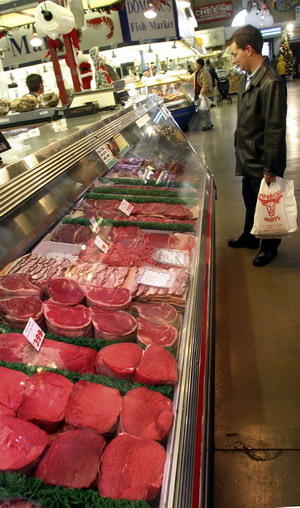Economy
Canada seeks to beef up its industry
By Mark Hughes (China Daily)
Updated: 2010-07-05 11:22
 |
Large Medium Small |
|
 |
|
A shopper contemplates a purchase of beef from a butcher in Toronto's historic St Lawrence Market. Chinese President Hu Jintao and Canadian Prime Minister Stephen Harper signed several important agreements in Canada late last month in fields ranging from trade to tourism, and pledged to double the volume of two-way trade to $60 billion by 2015. According to the new deals, the Chinese will get to enjoy Canadian beef again as the country resumes imports. [Agencies] |
Before the BSE crisis, Canada's beef and veal sales to the Chinese mainland peaked at C$7 million (2,700 metric tons). Its tallow sales peaked at C$35 million.
Negotiations on a resumption of trade were not helped when Canadian Prime Minister Stephen Harper criticized China over human rights issues and held an official meeting with the Dalai Lama.
So it was with a huge sigh of relief in Ottawa on June 24 that the Canadian government announced it had reached agreement with the mainland, the world's fourth largest beef consumer, to allow market access for Canadian beef and tallow. Imports will resume in stages starting with boneless beef from animals aged under 30 months and beef tallow for industrial use, according to a Canadian government statement following discussions between Chinese President Hu Jintao and Harper.
According to the Canadian Cattlemen's Association (CCA), an Alberta-based trade group, Canada may now export C$50 million ($48.1 million) in tallow and boneless beef annually to China during the first stage of the agreement. Exports may rise to C$110 million "once full access is established to include bone-in products," the CCA said. The move will help Canada maintain and grow its standing as one of the world's largest beef exporters and may be followed by talks on lifting a ban by China on beef imports from the US. Jim Miller, the head of the US Department of Agriculture's Foreign Agricultural Service has received a letter from Wei Chuanzhong, a vice-minister at China's quality inspection agency, indicating an interest in lifting the veto.
"Canada is bringing to our international clients a strong and renewed commitment to achieving export growth," Gib Drury, board chair of the Canada Beef Export Federation, told a seminar late April in Shanghai. "We are delivering a Canadian cattle identification system, age-verification, world standard food safety and animal health systems - and the high quality grain-fed Canadian beef taste and quality that has been demonstrated to meet your needs. There is a great enthusiasm for Canadian beef in all our priority markets and we have seen, as market access is regained and normalized, export volumes increase substantially.
The federation's international representatives have worked hard to maintain relationships with importers, distributors and end users. These, our customers, have enjoyed great success with Canadian beef and are eager for the opportunity to do so again. In this great market in China, that opportunity has arrived."
|
||||
"Canadian beef is the product of a world class industry, leading animal health and food safety systems, an internationally respected regulatory system and a superior grading system," said Haney, whose federation has set a target of selling more than half of its annual 800,000 tons of beef exports to Asian and Mexican markets by 2015, with 37,000 tons going to China alone by that date.
China's beef output reached 6.1 million tons in 2008, a year-on-year decrease of 0.5 percent, according to data from the Ministry of Agriculture. The Foreign Agricultural Service of the US Department of Agriculture expects China to become a net importer of beef this year, with imports growing 30 percent to 30,000 tons, mostly from Australia, Uruguay and New Zealand. The department estimates an additional 100,000 tons of beef enters China every year through gray channels, mainly from Brazil and the US.
With his foot firmly back in the door, Haney now plans a marketing blizzard while continuing efforts to lift the ban on Canadian beef in South Korea - "another very important market place".



